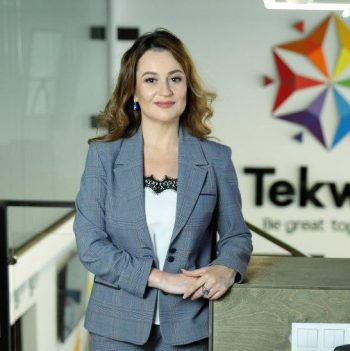“Minodora Rucan – What I’ve learned in 17 years in marketing: tips for beginners!
Interview by Natalya Vlasova
See the original Source on Vlasova Natalya official web page
Minodora Rucan, a programmer, marketer, and head of the software development app Fastboss which was the first to create a virtual assistant (AI) capable of taking care of all company documentation. Today, Fastboss is actively introducing the development to the international market, targeting customers in the U.S., Europe, and Asian countries.
Before launching the startup, Minodora Rucan managed the marketing department of Ecosem Grup, a construction company founded more than 17 years ago, which has successfully built 800 prefabricated apartments in apartment complexes around the country.

Minodora, thank you for sharing your experience with our readers. What are, in your opinion, the skills which a marketer should have to succeed in this profession?
I have asked myself this question many times, I have discussed with my acquaintances this questions “What kind of people are marketers?”, but opinions vary. Many believe that this is a creative profession, others assure that “market” and marketing are just about pure mathematics. More recently, it has become apparent that it is also an IT professional.
For me as a marketer, today must, or rather he has no right not to know such things as targeting, SEO, email marketing, marketing automation, and the introduction of Artificial Intelligence in marketing, which was created for the same targeting, but in a different scale.
From personal qualities: the ability to learn continuously, this is first and foremost. Also very important is the so-called “psychological sensitivity” – understanding the nature of the consumer.
A marketer is a specialist who knows how to manage a strong and at the same time “heterogeneous team”. He knows mass psychology, understands the principle of operation of the above-mentioned mechanisms. He also has a spontaneous and “adaptive creativity”, an analytical mindset, people – management, the ability to inspire and encourage anyone: from customers to members of his team – then, success and high earnings await him.
And what is “psychological sensitivity”?
Marketing begins with sales. We sell ideas, projects, opportunities. If a person has never worked in sales, then psychological sensitivity in him is unlikely to appear. It is unlikely he will be able to decide which creativity has the right to exist and which does not. The marketer should have the sensitivity to order and implement the kind of creativity that will give the entrepreneur the result he wants.
Do the qualities you mentioned have to be innate or acquired?
Certainly acquired! A person isn’t born with skills at all. All he has is his DNA and his studies. It changes his character, his outlook on life, it allows him to gain knowledge. Marketing, marketing is a profession, it means you can learn it.
But is it possible to become an expert in the field yourself? Well, for example, through lessons and training on the Internet?
You can, but would you entrust your money to such a marketer? The one who manages your advertising budget? After all, he is the one who decides how much and where to spend your advertising dollars. And so that they pay off several times over.
I believe that a professional can always answer the question: “How much profit on average should bring advertising costs? Without this data, business planning is impossible. Knowing the formula is one thing, but knowing what the result will be is quite another. A good marketer always knows the approximate result.
Classes and training are always good if they are organized by people who have practiced their theories and worked in marketing for several years. Often courses in sales or financial management can give you brilliant marketing ideas. So yes, training is important in this profession for intellectual development and new knowledge, but that’s not all.
So a marketer is always learning?
Of course, yes. As I said before, the thirst for knowledge is a necessary part of his character. There are notions that were not talked about when I was in school. Today they are relevant, actively practiced, and without them, you can not start an advertising campaign. My point is that things are constantly changing and evolving.
Also, a basic knowledge of business and economics is desirable. And having a higher education in a person, otherwise, the marketer and the businessman will speak different languages. They must understand each other well.
What type of marketing is the most effective in your opinion: event marketing, mobile marketing, network marketing, or digital marketing?
It all depends on the area in which the business is developing. B2B, B2P, or B2C, each of these models has its own working method. Before you invest in any of them, I would recommend creating some A, B experiments with a small budget and see the result.
Of course, if you have a lot of free money and can invest, go ahead. If not, set priorities and company goals. Most often people use those schemes that the budget allows, and then “fit” them all the possible promotion channels and elements of creativity.
Or you can work differently. Determine financial objectives, they dictate the budgets and select communication channels for marketing events and techniques. This requires formulas and analytical data to predict financial expectations with confidence.
It’s important to understand each of these types of marketing. For example, mobile marketing and digital marketing are the same. Mobile marketing is part of digital marketing. They are all related to each other. Digital – marketing has already gone to screens. There is a display – marketing, which is actively practiced by streaming services like “Netflix” or IVI. The company couldn’t afford TV ads, but they ordered ads on Google, and we, the users, watch them on the big screen as if they were advertising on TV.
Mobile – marketing and Web – marketing are the same thing. The whole secret is the cookie. If you open an ad once in Google Chrome, the next time you see it, it will open on both the PC and the mobile version.
Cookies. You mean the special “wise radar” on social networks and web pages that calculates all our cravings and needs, right?
Yes. Facebook is even wiser. It has its own advertising app, so smart that it can determine what you like or dislike, what you respond to, and what you’re indifferent to. As a result, you are offered to buy exactly what you need. If you were looking for a dress on FB, artificial intelligence will offer you also lipstick, a bag, shoes. Facebook knows everything: what we react to, where we go in and out, knows who our best friends are when we go to bed when we get up. Who we sleep with, who we work with…
Yes, that’s a fact. I know that in the U.S. there is almost no direct shopping in stores anymore, everything is through special websites and shipping. In fact, we have all predicted a rapid life in virtual reality.
It’s debatable. Now because of the coronavirus, we all have become “digital” and want to – want to our children began to learn from virtual lessons. However, without food, without nature, without personal communication, no one can live. Therefore, in the future, the involvement in virtual reality will grow more and more. More and more people will learn computer-related professions, but this may lead to a shortage of regular jobs: welders, plumbers, doctors, cooks, artists. They may be valued much more than they are now.
Speaking of the coronavirus. They say it has affected all of us, and people have begun to limit advertising budgets at times? Advertising campaign spending has started to go down. Is that true?
I can’t say about all industries, it all depends on the field of activity. I can only say that all marketing has migrated to the Internet, and therefore disappeared the so-called spontaneous buying, when a person bought something out of spontaneity, by choice. The path to the customer today is long, it consists of several stages, and in each stage, you have to invest money.
How should you sell? Aggressively or unobtrusively?
You have to sell according to the nature of the customer. The seller always needs to get a feel for who is in front of him, and by the way, that’s not really marketing anymore. Marketing has to help the customer and the seller meet. When it comes to online merchandise, the meeting between the consumer and the product, and the repeat purchase, is the result of good work by marketers.
Nowadays, it has become more difficult to sell: the oversaturation of the market and human information is taking its toll. On the other hand, thanks to artificial intelligence, information “adapts” to the needs of consumers, which has a positive effect on the process of buying and selling. Aggressive selling in such conditions does not make sense anymore. Consumers have become attentive, not so emotional, but rational. I think that after the pandemic everyone’s priorities will change, and people will greatly revise their system of spending money.
So, aggressive marketing doesn’t work anymore?
No. Digital – marketing, only destroys the product brand. Aggression is desperation or inability. Usually, when people see that someone wants to sell him something very strongly, they push the seller away. And in general, there is too much aggression now. Both in the world and on the Internet. People have developed a defense against it. Simply put, if you want people to run away from you, be aggressive. Intrusiveness, by the way, doesn’t work either.
Our time is a time of marketing with elements of art. People need not only to sell but also to please. Evoke in him the emotion of joy when he buys. Of course, the real art is to sell so that the customer leaves the store with the feeling that he met his old friends there. That he is happy with everything and very happy. We spend money and we have to get positive energy from it.
Marketing – is it more psychology or developed algorithms that help sell?
There’s a formula, and then there’s the reaction. There has to be chemistry. If the consumer hasn’t had any reaction to your creativity, then that algorithm doesn’t work. An algorithm is something that works and is used multiple times.
Marketing is, in a sense, the first sale. The first contact with the customer (soft sale). We first sell some image and text, a video with music or some other creative, and in return, we take the time of the consumer, or his email and other data. Good marketers use them to create the first level of the funnel. And then it’s a matter of technique…
If we weren’t able to initially engage our potential consumers, you’ve thrown your money away. To engage them, you need to be able to sell at least some of what we offer. Thus, a good start for a good marketer is, of course, selling.
These come in different forms. Every business is different, based on the nature and model of the business. So I would say that marketing is more about psychology and analytics than algorithms. Because it is after analyzing psychology and consumer behavior that certain algorithms are created for different consumers in different situations. And then – the automation of communication and all the business processes associated with marketing and sales funnels.
By what criteria, in addition to increased sales, can you consider that you have conducted a successful marketing campaign?
For example, we launched a campaign and made certain sales projections: how much we should earn on it. If the plan paid off by at least 80 percent, then the campaign is successful.
Manufacturers of products tend to plan for “in-season” and “out-of-season” sales. If the planned volume is realized, then the norm is fulfilled and even increased. It means that the marketing campaign was a success.
There are so-called “key performance indicators”, which are used in marketing, but they are the usual formulas created by analysts and financiers. Most of them also include such an indicator as sales volume.
And if you look at everything superficially, you can determine the goals of the marketing company. Were they achieved or not? If so, what graphs appear? If the goal was to attract traffic to the site, how did it come out?
If the goal was recognition, how many times, after the marketing campaign, was the brand mentioned online? You can find out. There are special tools for this.
If we are talking about an offline marketing campaign, it is most likely a long-term investment. And that means that the data on the success of the campaign should be tracked for several months after the campaign is over.
So in your 17 years in marketing, you’ve learned…
That it’s a continuous learning curve and working with interesting, creative people. It’s essentially a game between finance and creativity. To meet the financial needs of the company, we have to get the most out of creativity.



